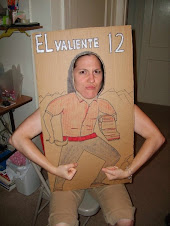Many times I’ve sat alone, watching happy couples snuggling together, laughing and holding hands. I don’t need to spell this out—everybody has seen something like this while sitting alone. It stinks. Everything I see that’s shared between two other people adds up to all the things I’m missing out on: shoulder-rubbing, hair-tousling, cheek-pinching, eyes-gazing. I pretend like I don’t want it, but of course I do. On my worst days, I’ve wondered if other people’s happiness juxtaposed with my loneliness means I’ll be alone forever. (As if strangers’ lives have anything to do with mine.) You know what I’m talking about: this is the beginning of the bad plot line in every bad romantic comedy (and I think all romantic comedies are bad). I’ve bitched and moaned and lamented my singlehood until even I am sick of myself.
What doesn’t happen often enough is the PDA I enjoyed this afternoon while sitting near a large window at a casual restaurant. Here, however, PDA would stand for Public Display of Anger. When I sat down, I noticed a couple sitting at a table outside, talking. I couldn’t hear what they were saying, but the conversation was punctuated by pointing, which developed into grandiose arm gestures, then standing askance behind their chairs. By the time I left the restaurant, where there weren’t many people, they’d moved to another space outside and were still obviously having a heated conversation.
I’d been dining alone, enjoying my own company and the pleasant, sunny day from a comfortable, air-conditioned space. I don’t wish ill on anyone, of course, but I wanted to thank this hapless couple for reminding me, in their own way, how happy I am that I’m not sharing such a heated conversation. Free to go my own way, free to do whatever I want, completely free. On my next less-confident day, when I’m feeling less free, I might wonder where they are and wonder whether they’re still arguing…and then I’ll take a moment to be thankful for the things I’m missing out on.
Here’s to you, Angry Couple. Now, if you’ll excuse me, I’m gonna go lay out in the sunshine. With myself. Try not to be annoyed by the smile on my face.
